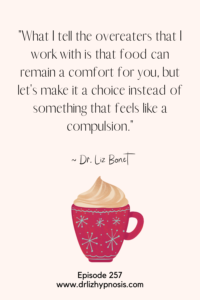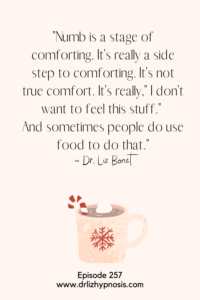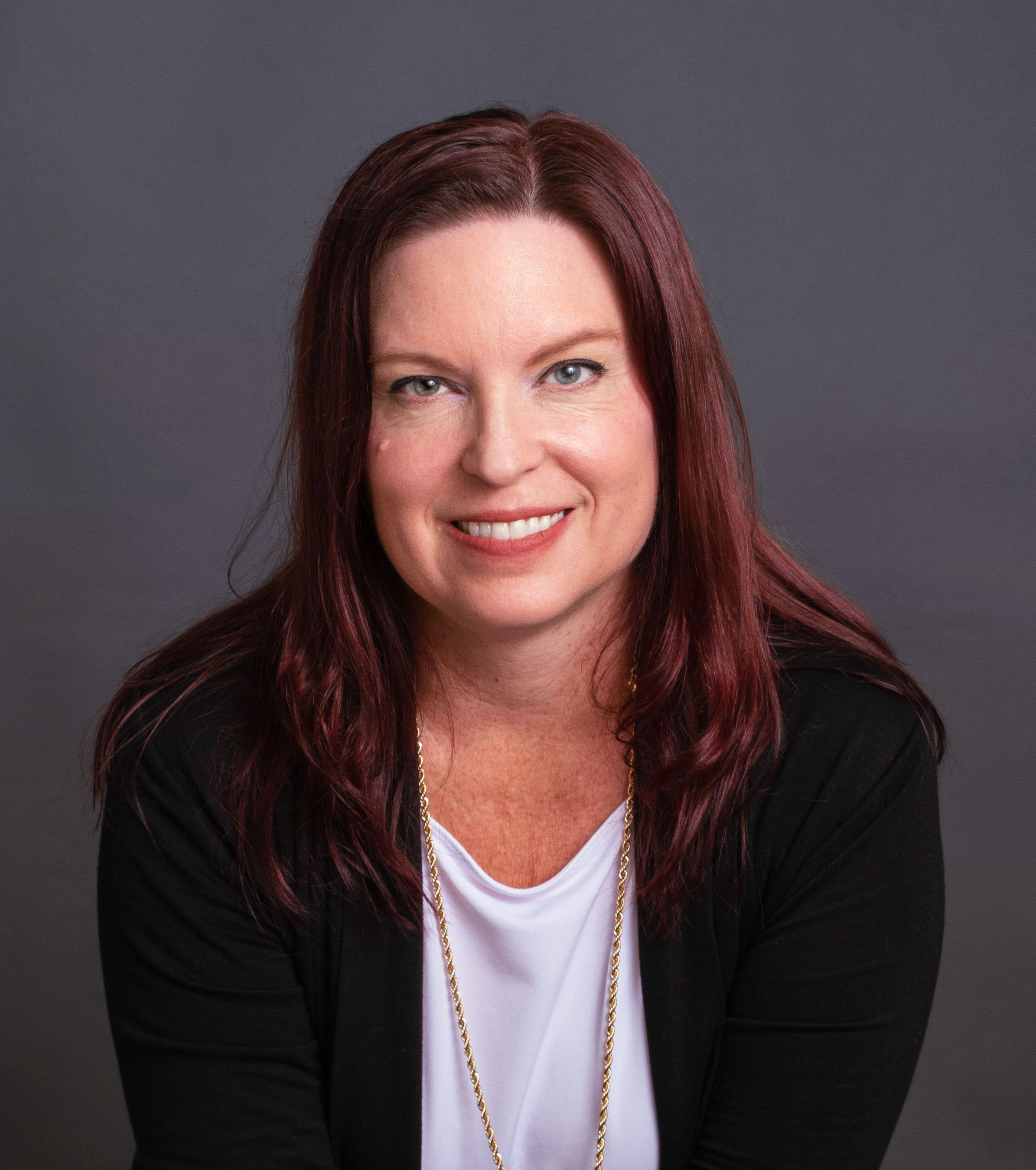Have you been told food should not be a comfort and then feel guilty about eating for comfort? If so, this is the episode for you. Dr. Liz talks about why it’s ok that food is a comfort, the Nordic concept of Hygee, and what to do with your feelings.
She talks about the difference between numbing and choice and an easy method to get away from stressful situations or feelings.
 |  |  |
About Dr. Liz
Winner of numerous awards including Top 100 Moms in Business, Dr. Liz provides psychotherapy, hypnotherapy, and hypnosis to people wanting a fast, easy way to transform all around the world. She has a PhD in Clinical Psychology, is a Licensed Mental Health Counselor (LMHC) and has special certification in Hypnosis and Hypnotherapy. Specialty areas include Anxiety, Insomnia, and Deeper Emotional Healing.
See more about Dr. Liz and get Free hypnosis files at http://bit.ly/drlizhypnosis
————–
Do you have Chronic Insomnia? Find out more about Dr. Liz’s Better Sleep Program at https://bit.ly/sleepbetterfeelbetter
Search episodes at the Podcast Page http://bit.ly/HM-podcast
Help yourself with Hypnosis Downloads by Dr. Liz! http://bit.ly/HypnosisMP3Downloads
———
A problem shared is a problem halved. In person and Online hypnosis and CBT for healing and transformation. Schedule your free consultation at https://www.drlizhypnosis.com.
Listened to in over 140 countries, Hypnotize Me is the podcast about hypnosis, transformation, and healing. Certified hypnotherapist and Licensed Mental Health Counselor, Dr. Liz Bonet, discusses hypnosis and interviews professionals doing transformational work
Thank you for tuning in! Please subscribe to auto-download new episodes to your listening device.
Listen in on my website!
Transcript:
Welcome. I’m Dr. Liz, an entrepreneur, speaker, podcaster, mom, and wife. This podcast is about hypnosis, but also about all kinds of ways to help you live your fullest life, to heal, transform, play the long game, and go after the joy. You can see more about me@drlizhypnosis.com. Hop over there to get a free hypnosis file to decrease fear and anxiety, or when to increase emotional stability.
They’re there just for you. I hope you enjoy the podcast as much as I do. Peace.
Let’s talk about food as comfort. Now, you will hear many, many experts say in the weight loss world, food shouldn’t be comfort, and I just think that. Hello to malarkey, like food is comfort for us. It’s hardwired into us for food as comfort. Like when we get hungry as babies, we cry, which is not a pleasant experience.
And then we either get changed or held or fed. And if we’re hungry and we’re crying, Then typically we get fed, which feels good. It feels comforting. So that’s something we’re just born with as mammals. That’s it. Some food is comfort. I can tell you for sure. Like some food is comfort for the dog that I have for the kitten, Susu, Soot Sprite, Susu for short, and for the uh, the other cat I have Hazel, like, yeah, all of them love food, love.
The dog in particular is very food motivated. She will do anything for food. Who knows what happened in her early history. She is a rescue, so I got her about two years old or so. . But to bring it back to people, we are hardwired for food as comfort.
Now, what happens is that sometimes that wiring is a little more so than for others, or sometimes it’s shaped by our environment, and so it gets intensified. So if you had a parent that tried to comfort you with food or that used food themselves to comfort themselves, then that’s a factor that probably shaped you.
I had a mother that used to eat ice cream every single day, every day of her life. Pretty much. She ate ice cream. It was like her snack at night, and there were many, many years that, that was my habit as well. . I already had my Ph.D., but I had to go back to take some classes to get licensed. So I had earned the Ph.D. and then got out of the field for about 10 years.
I never got licensed right after I earned it like most people do. And so I was going back into the field and I had to take some classes and one of them was on addictions and it was one of the most useful classes I ever. Rhonda Bohs was the professor’s name. I still remember her. And this was in, geez, what year did I take that?
Like 2008 or 2009 or something like that, that I took that class. She was fantastic though. Fantastic addictions professor. And she had us give something up and then journal about it, and I decided to give up ice cream. And went through that whole process. I really journaled about it, and one of my cats died around that time, and it was just so sad for me to do that without the comfort, quote, unquote, of ice cream.
I still remember that. She was not happy with my very extensive journal, by the way, , she’s like, “Dr. Bonet . . . You get the award for the longest journal. And um, and my partner was not very happy that I read the whole thing, that I had to read the whole thing.”
So, it was just very apparent to me once I did that. That this was something that was a comfort in my life and I had learned that behavior from my mother, who also did that.
From an eating disorders perspective, Eating disorder therapists, we do not recommend that you use food when you’re raising children for comfort or reward, or punishment. Like, don’t take away dessert as a punishment for something.
Or don’t say, oh, if you do that, you’ll get a cookie. You try to find something else that’s not food to help set them up for a healthier relationship with food. So if they don’t do that to themselves later either.
But having said that, I had a colleague who was a child psychologist, Ph.D. level, very, very good psychologist and very well known. And she told me one time, “You can bet your ass I’m getting on the treadmill for an for 30 minutes or 45 minutes so that I can have a piece of cake.” Okay. . and she’s like, food is a reward.
Um, And yeah, it motivates us to do all kinds of things sometimes. So it was just this moment of her acknowledging just this reality that we deal with sometimes as people.
So yes, we have our psychological recommendations. Don’t use food this way. Try to better your relationship with food and then the real life. . Yeah. It’s a reward sometimes for us, or, yes, it does feel comforting because it’s hardwired into us, or because we grew up with that in our households.
What I tell the overeaters that I work with is that food can remain a comfort for you, but let’s make it a choice instead of something that feels like a compulsion.
So sometimes that reaching for food does feel like a compulsion when someone’s feeling bad. And any overeater can relate to this. So what we do first is we raise the awareness around that and um, like one of my friends said, she’s like, oh yeah, I’m eating an entire pint of Ben and Jerry’s, but I’m aware of it. I’m aware that I’m sad , and I’m crying while I’m doing it. That’s awareness, right?
I was like, yes. That’s awareness. So the first thing we do is raise awareness around it. You’re feeling bad. Your first instinct is to reach for some kind of food. That’s comforting. That’s okay because really the important piece in there is comfort.
Reaching for comfort. So it’s like, let’s then look at our list of everything else that can be comforting for us. And that varies from person to person, obviously. But make a list. Make a list of three to five things. I’ll give you my list. It’s tea, a bath, a walk, and by a walk, I mean a stroll. Okay. A stroll around the block or something.
Art. Ironing. I know, but it is. Ironing is comforting to me. Sewing. . It’s usually not TV for me or it’s usually not my phone. It is for some people, like scrolling on their phone just helps calm them down. Nothing wrong with that. Calling a friend. Oh, that’s definitely on mine. So you grab your list and you say, okay, am I willing to do any of these or do I really need to have something that just feels comforting for me that is food.
And if that is the case, then you make that a choice versus like, I have to, I have to eat ice cream to feel better. It’s like, no, I have the choice here to do this or that. Or I could choose ice cream or I could choose something that’s healthier for me to feel better.
It’s really interesting. When I work with someone, and also in my personal life I’ve experienced this, that you think that there’s no way you could give up food. No. That’s my top thing. And ice cream is a common one for people actually. And then once you do decide to give up that food for various reasons. It just does not become a factor in your life.
You can completely forget about it. It’s funny because last night, Eva, my 16, almost 17-year-old, she turned 17 in December and I was talking about food cycles we go through. So she’s making homemade non, which is like the small round Indian bread. It’s pretty easy to make it home. And she was like, we tend to go through food cycles.
Like we make a batch of these and then we forget about them for. Same with broccoli people. We will eat broccoli every single night because we love like roasted broccoli in the oven. We’ll eat broccoli every single night for months. Really months and then it’ll disappear off the menu for months. It’s like we’re broccolied out maybe, I don’t know.
And then all of a sudden I remember again and like, Hmm, broccoli sounds really good. I mean, some intuitive nutritional people will say, that’s probably my body saying it needs something and then doesn’t need that as much. When you look at the food addiction world, I don’t think that really fits meaning.
My body doesn’t truly need ice cream. Okay. where your junk food chips, it really doesn’t. No. Junk food is an exception to that. I don’t really believe our, our body needs nutrients from particular junk food because junk food doesn’t have real nutrients in it, honestly. But when you’re talking about real food, whole foods, natural foods, non-processed foods, that probably is the case.
I took a little side trail off the. Main mountain path here, but back to comfort. Drop the “shoulds” around it, that food shouldn’t be comforting. Absolutely it is. There are certain foods that are more comforting for you than others due to various reasons in your upbringing or in your present life. So again, those may change from time to time, or you may pick something that feels healthier for your body, but absolutely in food discomfort, there’s the Nordic countries who have the concept of “Hygee.” I’m not saying it properly, but I’m sure my friend can say it much better. It’s spelled H as in Harry, Y, G as in go, E, E. So “H Y G E E”. I read a couple of books about this earlier in the year, and it’s all about how to set up your home for comfort and these different rituals the Nordic countries have for comfort, and how to make a really cozy space.
And food is all over those books. In particular, pastries or hot chocolate or wine or tea. It is absolutely in there. I think it’s such a big difference from the US where we’re all about giving stuff all the time. Like, what are you giving up and what are you doing this, and what are you cutting out and, um, what are you, what kind of diet are you following, or what kind of “lifestyle” are you following?
Versus when I read more about the Nordic countries or talk to my friends from those countries, I know a couple of people. It’s almost like they’re more about adding, like what can you do to help yourself feel cozy, help the home feel cozy? What kind of pillows can you get or candles, or books or pastries, what can you add?
I find it a really interesting difference, but it’s also something to keep in mind now if you feel like you’re always reaching for food to comfort rather than being able to do other things as well or in place of. And it feels compulsive to you, like, I have to do this. I have to eat this to feel better or to numb the feelings.
Then I really suggest that you get some help around that you, whether that’s hypnosis or therapy, or you do an online program. Something like that so that it doesn’t feel bad to you anymore, so that it does feel like a choice that you’re making so that your body feels healthier. Now when you choose not to eat the food, this does not always mean that you feel the feelings.
Okay, so speaking of numb means, some people do choose “comfort food” to numb themselves from feelings, which is slightly different than comforting yourself with food. Numbing is a way of comforting yourself, really. It’s like if we could get to real comforting where you feel more stable emotionally, okay, all of that, that’s actually not numb.
So numb is a stage of comforting. It’s really a side step to comforting in my mind. It’s not true comfort. It’s really just like, I don’t want to feel this stuff. And sometimes people do use food to do that overeaters or binges. So when they’re working on that, I actually don’t recommend that you feel your feelings all the time.
instead. I know it’s funny for like a psychotherapist to say, and I, uh, put up a video on YouTube if you want to go check it out just about this it, if it’s too hard. To feel your feelings. If you feel overwhelmed by this urge to eat, in order to numb, in order to not feel the feelings, try doing something else instead of feeling the feelings or instead of eating pay, detach yourself from the situation if you can, or whatever it is you you’re facing.
Distract yourself and decompress. So do something else other than eat to distract yourself. And do something to help yourself decompress. That means bring the stress level down. That may be journaling or something active, like going out for a walk or a run or the gym or something like that, that may be holding up on the couch, you know, watching or YouTube on your phone or, I don’t know, whatever it is.
Know that that’s a wave that’s coming and going. Those feelings and that they’re going to pass. So you’re not required to feel. . But when you’re really working on not reaching for food to numb, then you’ve gotta do something in that in between space until they do pass or until it’s a better time to feel them.
So it’s not always like great times to feel feelings when they come up. Let’s say you’re in the middle of a pretty intense situation or a crisis or something like that. It’s not like, oh, feel all your feelings, let it, like, no, this is not going to happen. Sometimes you do have to like, shut ’em down, keep it together, handle what’s going on.
And then look at them later and let them come up later, but also have a plan for that. Like, all right, I am going to look at this later, and this is my plan. If you’re working on not overeating or having food, be a choice for comfort, then you want your little plan written out somewhere for you to look at it.
Whether that’s your phone or notebook or on the kitchen cabinets or somewhere like that, somewhere where you can actually look at it and then choose something to do off of that. All right, everyone. I hope this gives you some perspective around food being comfort, and I hope you’re healthy and happy and safe peace.
I hope you truly enjoyed today’s episode. Finally, if you’d like today’s episode, please subscribe to the podcast or tell a friend. That way, more and more people learn about the power of hypnosis. All right, everyone have a wonderful week. Peace. This podcast is not mental health treatment, nor should it replace mental health treatment. If you need therapy or hypnotherapy, please seek treatment from a trained professional.
Before you go, remember to get your Free Hypnosis to reduce Fear and Anxiety!
I work with people all over the world. If you want to feel better and have a transformed life, grab your Free Consultation with me to get the deets on working together (the how, the when, the where, and the how much)!
Click to Schedule a Free Consultation
Peace and Health,
Dr. Liz







